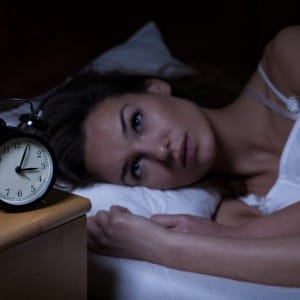
Insomnia
Insomnia may be difficulty getting to sleep, difficulty staying asleep, or both. If you feel that you’re not sleeping well, not sleeping enough, or not enjoying good quality sleep, there are ways to improve sleep so that you wake up feeling rested and refreshed.
Sleep Initiation Insomnia
Sleep initiation or sleep onset insomnia occurs when it takes a long time to get to sleep. If it takes you longer than 25 minutes to fall asleep on a regular basis, then there is a problem.
9 Top Tips for Dealing with Difficulty Getting to Sleep
Here are some tips to help you get to sleep and stay asleep:
- Avoid caffeine after noon, including coffee, tea, green tea and chocolate.
- Avoid sugar and carbs in the evening before bed.
- Have a little protein before going to bed to stabilize blood sugar.
- Avoid stimulating activities in the evening – thrilling TV shows, books or movies, video games.
- Dim the lights inside once it’s dark outside to encourage natural melatonin (sleep-inducing neurotransmitter) production.
- Maintain a regular bedtime and a regular bedtime routine.
- Relax from 8 p.m. onward to calm the nervous system.
- Avoid high-intensity exercise from 7 p.m. onward.
- Engage in calming/relaxing activity in the evening – warm bath, soothing music, meditation.
Sleep Maintenance Insomnia
Sleep maintenance insomnia occurs when people get to sleep but then wake frequently throughout the night. Some can go back to sleep quickly, while others can take hours, if at all, to resume sleep. Either way, broken sleep is not good quality sleep, and people won’t wake up feeling refreshed and energized.
4 Best Tips for Sleep Maintenance Insomnia
Maintaining good sleep hygiene, as listed above, is also vital for sleep maintenance. Additionally, it may also help to:
- Avoid alcohol in the evening.
- Have a little protein before going to bed – leftover fish or chicken, hard-boiled egg seem to work best.
- Support your adrenal glands. Your stress glands help maintain stable blood sugar throughout the night. Dips in blood sugar are often the catalyst for nighttime waking.
- Keep a little almond milk beside your bed so that if you do wake up, you can have it to quickly get your blood sugar back to normal, so you can resume sleeping.
Herbs for Insomnia
Valerian, hops, and passionflower often combine to help people relax and feel sleepy. Chamomile is also good for calming and relaxing. Teas are a less intense way to take these herbs, but may also be less effective than a good-quality tincture or tablet. Plus, drinking tea in the evening may lead to nighttime visits to the bathroom. Many other herbs can be used to assist sleep. As a naturopath, I am the best resource for guiding you to the most effective herbs for you.
Vitamins and Minerals for Insomnia
For your brain to produce enough sleep neurotransmitter melatonin, you need vitamin B6, magnesium, tryptophan, and darkness. Vitamin B6 and magnesium are essential cofactors in many enzyme reactions, including melatonin production. B6 and magnesium are also essential in helping your body adapt to and deal with stress. If demand for these is high and supply is low, you may be unable to produce adequate amounts of melatonin and several other important neurotransmitters.
Melatonin for Sleep
Melatonin supplementation may be helpful for those with sleep initiation insomnia, as it can help you feel sleepy. Some people will find that they have nightmares while taking it, others will wake up feeling groggy, and a third group will have the best sleep of their lives with it.
Everyone is unique, and what works for some may not work for others. It is always best and most efficient to see a licensed naturopathic doctor rather than self-medicate.
For help with this or any other health problem, book an appointment here or call the office for more information at 416-481-0222.
Medically reviewed by Dr. Pamela Frank, BSc(Hons), ND
Dr. Pamela has practiced as a naturopathic doctor in Toronto since 1999. She has received numerous “Best Naturopath in Toronto” awards. She is registered with the College of Naturopaths of Ontario.
Dr. Pamela Frank uses a natural treatment approach that may include acupuncture, herbal medicine, nutrition, diet, vitamins, supplements, and other natural remedies to restore balance and provide long-term resolution to almost any health problem.
Natural Treatment for Insomnia: A Sample of the Research
The findings of this study suggest that lettuce seed decreased insomnia during pregnancy and could be recommended as a safe natural remedy for the treatment of pregnancy-related insomnia. Source: J Ethnopharmacol. 2018 Dec 5;227:176-180. doi: 10.1016/j.jep.2018.08.001. Epub 2018 Aug 30.
Double-blind randomized placebo-controlled trial on efficacy and safety of Lactuca sativa L. seeds on pregnancy-related insomnia. Pour ZS1, Hosseinkhani A2, Asadi N3, Shahraki HR4, Vafaei H5, Kasraeian M6, Bazrafshan K7, Faraji A8.
The results showed that 8-week supplementation with 3 g MO can decrease depression, anxiety, stress, and sleep disorder in patients with chronic stable angina. Source: Clin Nutr ESPEN. 2018 Aug;26:47-52. doi: 10.1016/j.clnesp.2018.04.015. Epub 2018 May 19.
The effects of Melissa officinalis supplementation on depression, anxiety, stress, and sleep disorder in patients with chronic stable angina.
Haybar H1, Javid AZ2, Haghighizadeh MH3, Valizadeh E4, Mohaghegh SM5, Mohammadzadeh A6.
Medicinal plants can play an imperative role in the treatment of acute menopausal syndrome. Source: Electron Physician. 2017 Nov 25;9(11):5826-5833. doi: 10.19082/5826. eCollection 2017 Nov. A review of effective herbal medicines in controlling menopausal symptoms. Kargozar R1, Azizi H2, Salari R3.
